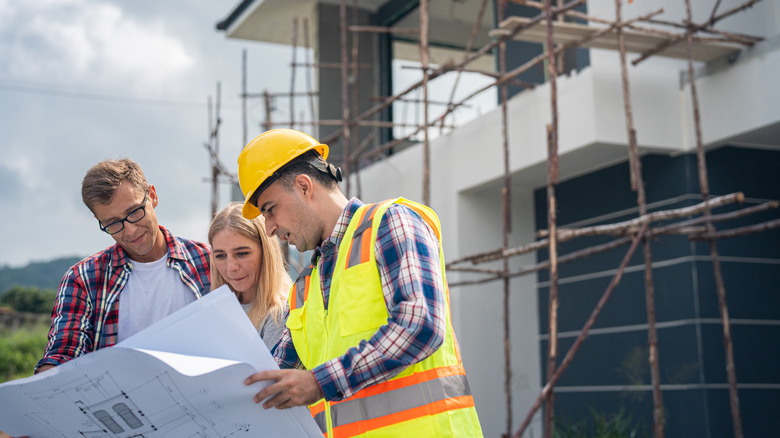When Do Mortgage Payments Start When Building A Home?
New construction homes have become more popular in recent decades, ensuring that buyers can get the exact floorplan and style that they want, compared to a move-in-ready home. But if you're constructing your own home, you might wonder when exactly you'll have to start making mortgage payments. After all, it seems unfair to pay a mortgage on a home that doesn't exist yet. Custom-built homes and newly built spec homes may have slightly different payment requirements based on the builder or developer. When you buy a spec home from a developer, your mortgage payments essentially pay for the finished product after its completion, with relatively little paid upfront. On the flipside, a newly built custom home will require that you pay for materials and labor associated with the project throughout the entire building process. In both situations, however, buyers usually won't make any mortgage payments until the home is finished.
But that doesn't mean buyers are totally off the hook. Unless you're paying for the entire project with cash, building your dream home will require some type of construction loan. A construction loan primarily covers the costs associated with the actual building process, including the lot, materials, and labor. It may also cover the cost of permits if you haven't yet obtained them. Unlike a mortgage that is paid over a period of several years, a construction loan has a shorter timeframe, usually several months. Construction loans also require a down payment, which is significantly higher compared to a typical mortgage fee due to its shorter timeframe. In summary, while you might not pay a mortgage yet, you may need to start making payments on your construction loan immediately.
The mortgage can wait, but other costs may apply
Another option is getting a mortgage immediately at the end of your construction loan, also known as a construction-to-permanent loan. This can be a wise choice if you aren't able to repay the entire construction loan in cash after building is complete. In these cases, whatever you still owe from the initial loan is rolled into a mortgage with regular monthly payments over a fixed period of several years. With this method, your mortgage payments will technically still begin after construction is finished, but they may be higher because you're still paying off the initial construction loan.
Of course, not every newly built home is a custom home. Payment plans may be different if your home is constructed by a developer. If you're working with a developer, they may pay for the construction process upfront, only requiring you to put down a deposit (usually around $1,000 to $2,000) to effectively reserve the space. In these cases, you won't typically need to worry about making any monthly payments until the home is actually finished. Once the home is complete, you'll be expected to repay the developer either in cash or through mortgage payments. This delayed payment could be one of the deciding factors in whether you should buy a spec house or a custom home.

